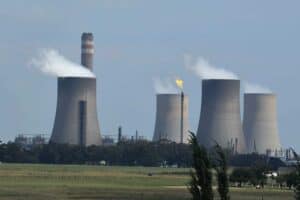Fears ‘cherry-picking’ of its best customers.

Eskom has made good on its earlier threat to challenge in court energy regulator Nersa’s granting of licences for electricity trading.
It wants trading rules to be finalised first and even suggests that traders contribute to the payment of municipalities’ R100 billion arrear debt for bulk purchases.
Following Nersa’s publication of the reasons for its decisions, Eskom has launched an application in the Gauteng Division of the High Court to have the granting of five trading and one import/export licence reviewed and set aside.
The respondents are Nersa and the five licensees: Green Electron Market, CBI Electric Apollo, GreenCo Power Services, Discovery Green and Noa Group Trading.
This comes more than decade after the first electricity trading licence was granted to PowerX. Nersa has so far granted around ten such licences.
According to the agenda, the regulator will consider two more trading licences and two import/export licences at its 30 July meeting, as well as an application by a municipality for separate distribution and trading licences. If granted, Eskom may join the new licensees to the action.
Traders, also referred to as aggregators, are essentially middle-men between independent power producers and end-users. They enter into agreements with multiple generators and sell to multiple customers with diverse energy requirements, at a margin to compensate them for taking some of the risk.
This enables especially smaller businesses to access renewable energy despite being unable to take the full production of a specific independent power producer or enter into a 20-year off-take agreement.
ALSO READ: Electricity trading? Not so fast, says Eskom
Eskom’s argument
In an affidavit in support of the application, Eskom senior manager for legal matters Mohlago Masekela says the licensing decisions “form the beginning of a fundamental change of policy by Nersa that has not been the subject of public consultation and the implications of which appear not to have been explored by Nersa.”
According to Masekela it will “upend the entire landscape of electricity provision in this country, without taking meaningful steps to understand the consequences before doing so.
“Under the guise of promoting competition and labouring under material misapprehensions about the law and the facts, Nersa has allowed a free-for-all in which traders are allowed to poach the best of Eskom’s customers without carrying any of the redistributive obligations that the tariffs paid by those customers to Eskom enable Eskom to discharge.”
Eskom contends that its distribution licences and those of municipalities, grant them the exclusive right to distribute and trade in electricity in the licensed distribution areas. It relies on Nersa’s distribution rules that prohibit two or more distributors to operate in the same area.
According to the utility, no rules have ever been made to deal with electricity trading as a separate licensed activity. Although Nersa has acknowledged the need for such rules and has embarked on a process to finalise it, it proceeded to approve trading licences in the meantime. This, Eskom states, is irrational.
Eskom submits it is not possible to lawfully issue individual trading licences on an ad hoc basis, without considering the impact on the businesses of Eskom and municipalities of traders cherry-picking its best clients and setting conditions to balance the rights of such traders with those of Eskom and the municipalities.
ALSO READ: Nersa approves cross-border electricity trading
Eskom argued that instead of promoting competition, the granting of the trading licences will lead to unfair competition, because traders will have the flexibility to offer large power users, that are consistent payers, discount tariffs, while Eskom is bound to regulated prices.
The utility states that “simply opening up a free-for-all for traders in areas of supply previously provided by either Eskom or a municipality, has the potential of causing profound risk to the viability of the system”.
“Eskom continues to hold the various obligations arising from the obligations in its distribution licences, but can now have its most reliable and lucrative customers taken from it by traders given permission to trade in the same area of supply.”
It continues: “Ultimately, since it is funded by both the taxpayer (in the form of government assistance given in the recent past) and the electricity consumer, it is taxpayers and smaller electricity consumers who are not attractive to traders, who will pay the price for this.”
Some of the issues Eskom believes should be addressed in the trading rules include which customers will be allowed to chose who they buy electricity from, thereby demarcating the trading market.
If customers are for example allowed to buy from a trader, but top-up continuously or on an ad hoc basis from Eskom’s supply, the rules could provide for Eskom to set differentiated tariffs in such cases “that reflect the true cost of providing these specific services.”
ALSO READ: Presidency ‘very concerned’ about licence for Eskom transmission unit
Eskom further suggests that the matter of the R100 billion-odd arrear municipal debt must be dealt with in the trading rules by restricting traders from operating in defaulting areas or establishing a financial clearing house that prioritises the payment of Eskom arrears before disbursing revenue to traders.
It suggests that the cross-subsidisation regime should be preserved, with traders being required to contribute to a subsidy pool or municipal support levy.
It is not yet clear whether Nersa and the five traders will oppose Eskom’s application.
This article was republished from Moneyweb. Read the original here.






